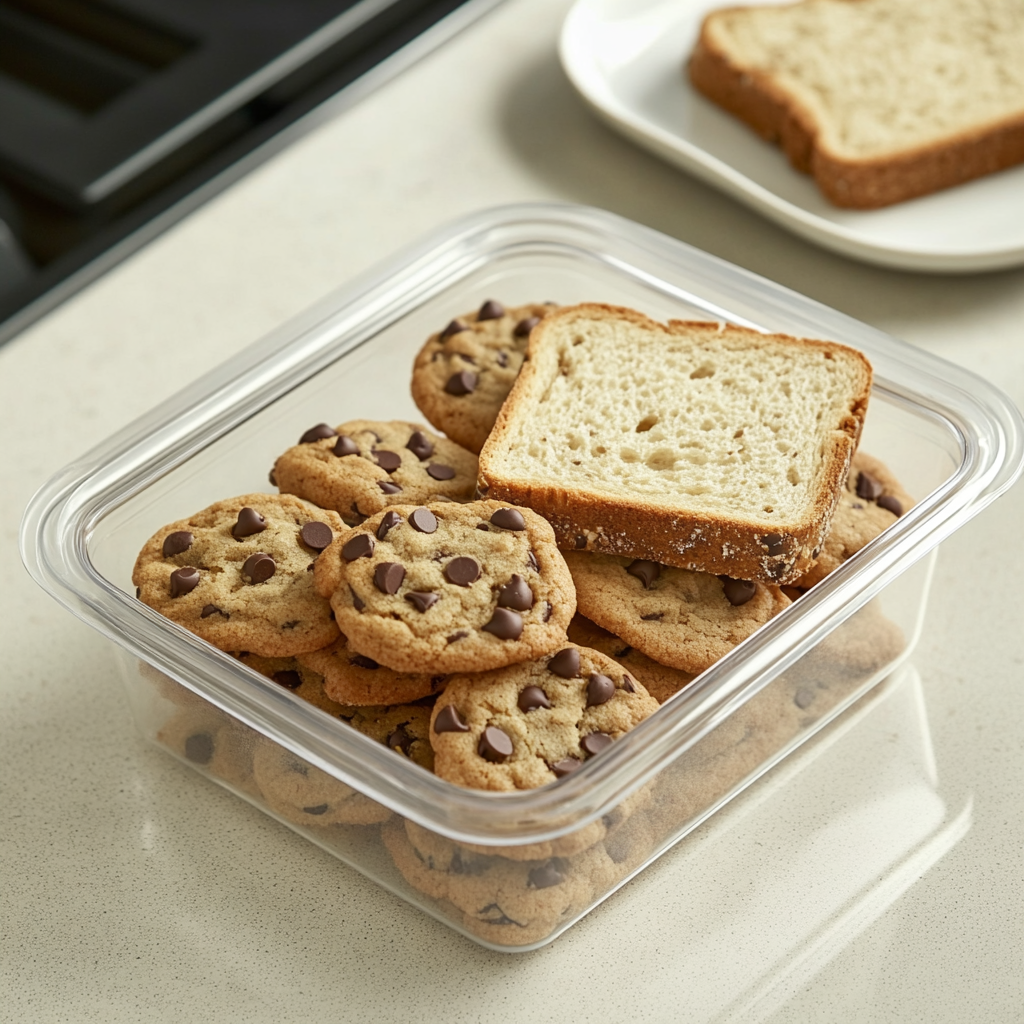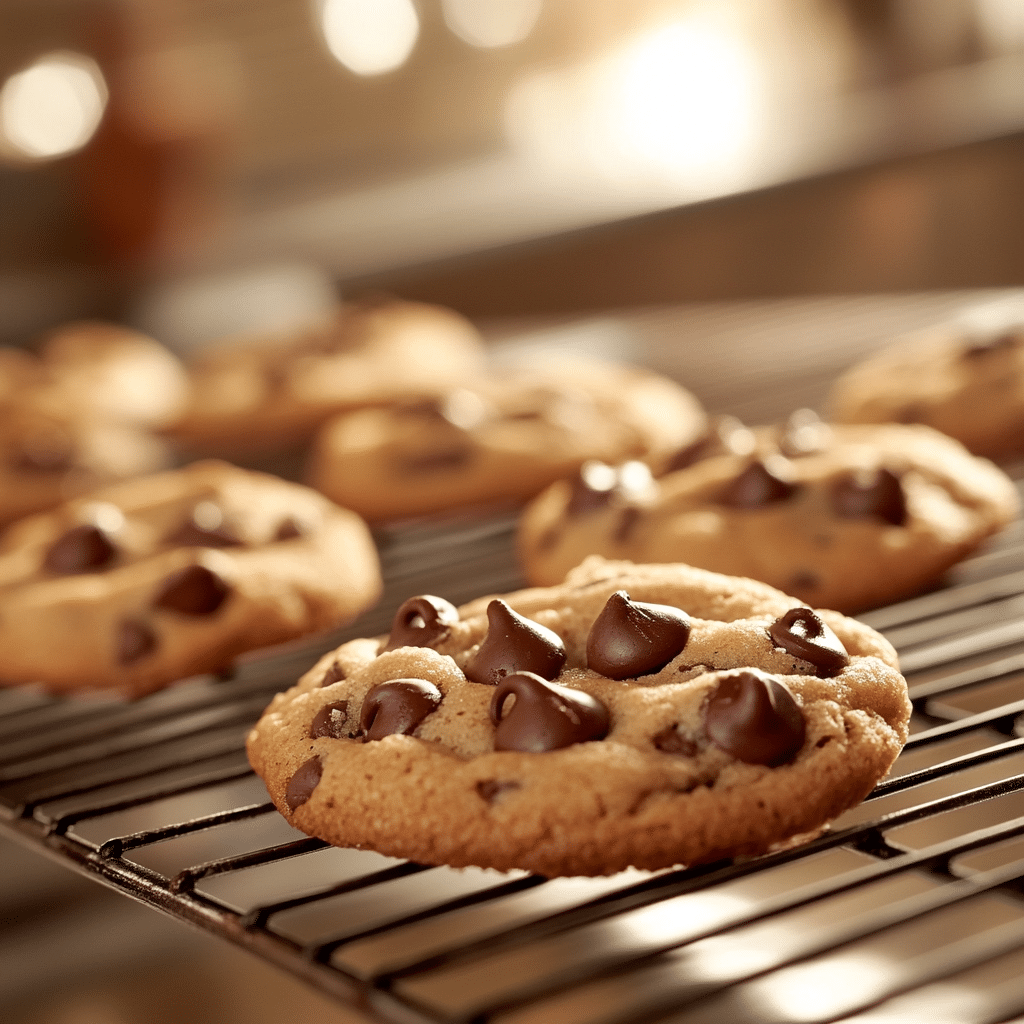Table of Contents
Everyone loves a perfectly baked cookie—soft, chewy, and fresh. But what if you knew the secret ingredient to keep cookies soft and chewy for days? It’s all too common for cookies to turn hard quickly, but by using the right ingredients and baking techniques, you can maintain that soft, delicious texture longer.
If you’ve ever wondered what the secret ingredient is that keeps cookies soft, you’re in for a treat. There isn’t just one solution, but a combination of the right ingredients and techniques can help you achieve that perfect texture every time. From using the right type of sugar to incorporating moisture-retaining ingredients, small tweaks can make a world of difference.
In this article, we’ll break down the science of soft cookies, the ingredients that contribute to their texture, and the secret ingredient that takes your cookies to the next level. We’ll also explore key baking techniques and tips for storing cookies to help them stay fresh and soft for longer.
But what if you knew the secret ingredient to keep cookies soft and chewy for days?
Ready to uncover the secret to achieving cookie perfection? Let’s dive in!
The Science Behind Soft Cookies
Understanding the science behind baking will help you find the best secret ingredient to keep cookies soft.
To understand how to keep cookies soft, it’s important to first understand why they become hard. The key factors are moisture and texture. Here’s a breakdown of why cookies lose their softness and how to combat it.
Why Do Cookies Become Hard?
Cookies become hard when they lose moisture. When you bake cookies, the heat causes the water inside the dough to evaporate, creating steam that helps the cookies puff up. As they cool, the moisture continues to escape, leading to a hard or crunchy texture. The longer they sit out, the more moisture they lose.
Other factors that contribute to hard cookies include:
- Overbaking: Even an extra minute in the oven can dry out your cookies.
- Low Fat Content: Fat, like butter, helps retain moisture.
- Improper Storage: Exposure to air speeds up moisture loss.
The Role of Moisture in Baking
Moisture is the key to soft cookies. Ingredients like butter, eggs, and sugars not only add flavor but also retain water. The more moisture your ingredients provide, the softer and chewier your cookies will be.
A perfect balance of moisture and structure (from flour and leavening agents) is necessary. Too little moisture and your cookies will be dry. Too much, and they’ll turn cakey or fall apart.
Incorporating the right ingredients and techniques ensures you maintain this delicate balance, giving you the soft texture you crave.
Key Ingredients for Soft Cookies
Brown sugar is a key part of the secret ingredient to keep cookies soft because it adds moisture.
Achieving soft cookies is not just about one magical ingredient; several ingredients work together to create the perfect texture. Let’s look at the key players that keep cookies soft and chewy.
The Role of Brown Sugar
Brown sugar is a must-have for soft cookies. Unlike white sugar, brown sugar contains molasses, which adds moisture. This moisture helps prevent cookies from drying out too quickly. The acidity in molasses also reacts with baking soda, giving your cookies a chewy texture.
- Tip: Use dark brown sugar for even more moisture and a richer flavor.
Why Cornstarch is Effective
Adding cornstarch to your cookie dough helps soften the texture. Cornstarch absorbs moisture and retains it during baking, keeping the cookies tender. It also reduces gluten development, which can otherwise make cookies tough.
- Tip: Add 1 to 2 teaspoons of cornstarch to your flour mixture for extra softness.
How Honey or Molasses Adds Softness
Honey and molasses are natural humectants, meaning they attract and retain moisture. Adding a tablespoon of either to your dough can help keep cookies soft for longer. They also add a subtle sweetness and depth of flavor.
- Tip: Replace part of the sugar with honey or molasses to boost moisture.
The Secret Ingredient Revealed
While many ingredients contribute to keeping cookies soft, there is one standout secret ingredient that takes cookie softness to the next level: corn syrup. This ingredient might seem unexpected, but it’s a game-changer for achieving perfectly soft and chewy cookies. Let’s break down how corn syrup works and explore some other surprising additions that can maintain cookie softness.
How Corn Syrup Keeps Cookies Soft

Corn syrup is a liquid sweetener that contains glucose. Unlike granulated sugar, corn syrup adds moisture and prevents crystallization. This means that cookies made with corn syrup stay moist and chewy for a longer period compared to those made with just white sugar.
Why does it work?
- Moisture Retention: Corn syrup keeps moisture locked in during the baking process, preventing cookies from drying out too quickly.
- Preventing Crystallization: White sugar can crystallize, making cookies hard and crunchy. Corn syrup interferes with this process, maintaining a soft, flexible texture.
- Consistency: It distributes evenly in the dough, ensuring a consistent chewiness throughout the cookie.
How to use it:
- Replace 1 tablespoon of sugar with 1 tablespoon of light corn syrup. Be careful not to add too much, or the cookies may become overly sweet or too sticky.
The Effect of Cream Cheese
Another secret ingredient that can keep cookies soft is cream cheese. Adding cream cheese to your dough introduces extra fat and moisture, which helps maintain softness. Unlike butter, cream cheese also adds a slight tanginess that complements the sweetness of the cookie.
Benefits of Cream Cheese:
- Moisture Boost: The high moisture content of cream cheese helps keep cookies from drying out.
- Texture Enhancement: It makes the dough richer and creamier, resulting in a soft, tender crumb.
How to use it:
- Replace half of the butter in your recipe with cream cheese for softer, more tender cookies.
Exploring the Effect of Glycerin
Glycerin is another secret ingredient used by professional bakers to keep baked goods soft. It’s a humectant, meaning it attracts and holds onto water molecules, helping cookies stay moist for longer. Though not as common in home kitchens, a few drops can make a noticeable difference.
How to use it:
- Add ½ teaspoon of food-grade glycerin to your cookie dough to retain moisture. A little goes a long way!
Baking Techniques to Keep Cookies Soft
Even with the right ingredients, your baking technique can make or break your cookies’ softness. Here are some tried-and-true methods to ensure your cookies stay tender and chewy.
Chilling the Dough for Best Results
One of the best ways to improve cookie texture is to chill the dough before baking. Chilling the dough helps solidify the fats (like butter), which slows down the spreading during baking and creates a thicker, softer cookie.
Benefits of Chilling:
- Enhanced Flavor: The resting period allows the flavors to meld, giving the cookies a deeper taste.
- Controlled Spread: Cold dough spreads less in the oven, keeping the cookies thicker and chewier.
Tip: Chill the dough for at least 1 hour, or even overnight, for the best results.
Baking Time and Temperature Control
The baking time and temperature play crucial roles in achieving soft cookies. Overbaking is one of the most common mistakes that lead to hard, crunchy cookies.
Tips for Baking Soft Cookies:
- Lower Temperature: Bake cookies at 325°F (160°C) instead of 350°F (175°C) to ensure they bake evenly without drying out.
- Underbake Slightly: Remove the cookies from the oven when the edges are set, but the centers still look slightly underdone. They will continue to cook on the hot baking sheet as they cool.
Avoid Overmixing the Dough
Overmixing cookie dough can develop too much gluten, which leads to tougher cookies. Mix your dough until just combined to avoid this problem.
Tip: When adding the dry ingredients to the wet mixture, stir until you no longer see streaks of flour—then stop!
Tips for Storing Soft Cookies
Even the softest cookies can turn hard if they aren’t stored properly. Follow these storage tips to keep your cookies fresh and chewy for days.
Using Airtight Containers
Air is the enemy of soft cookies. Storing cookies in an airtight container helps lock in moisture and keeps them from becoming stale.
Best Practices:
- Use containers with tight-fitting lids.
- Separate layers of cookies with parchment paper to prevent sticking.
Adding a Slice of Bread

This old trick works wonders for maintaining cookie softness. Place a slice of white bread in the container with your cookies. The bread releases moisture, which the cookies absorb, keeping them soft.
Tip: Replace the bread slice every couple of days to maintain freshness.
Freezing Cookies for Longer Shelf Life
Freezing is a great way to keep cookies soft for weeks or even months.
How to Freeze Cookies:
- Let the cookies cool completely.
- Place them in a single layer in a freezer-safe container or bag.
- To serve, let them thaw at room temperature for 30 minutes or warm them in the oven at 300°F (150°C) for a few minutes.
Heading 2: Common Mistakes to Avoid When Baking Soft Cookies
Even with the right ingredients and techniques, common mistakes can prevent your cookies from staying soft. By understanding these pitfalls, you can avoid them and bake perfect, chewy cookies every time.
Overbaking the Cookies
One of the most common reasons cookies turn out hard is overbaking. Even just a minute or two too long in the oven can dry out the cookies, making them hard and crunchy.
How to Avoid Overbaking:
- Watch the Edges: Remove the cookies when the edges are set and the centers are still soft and slightly underbaked. They will firm up as they cool on the baking sheet.
- Use a Timer: Set a timer and check the cookies a minute or two before the suggested baking time to prevent overbaking.
- Bake in Batches: If you’re baking multiple trays, bake one at a time to ensure even heat distribution.
Using Too Little Fat
Fat plays a crucial role in keeping cookies soft. Ingredients like butter, cream cheese, or shortening provide moisture and tenderness. If you reduce the amount of fat in a recipe, the cookies can end up dry and crumbly.
How to Ensure Enough Fat:
- Stick to the recipe’s recommended amount of butter or oil.
- Avoid substituting low-fat options, as they can affect the texture.
- For extra softness, you can add a tablespoon of cream cheese or a teaspoon of corn syrup.
Skipping the Dough Chilling Step
Chilling the dough helps cookies maintain their shape and texture. If you skip this step, your cookies might spread too thin and lose their chewy, soft interior.
Why Chilling Helps:
- Chilled dough allows the fats to firm up, which reduces spreading during baking.
- It gives the flour time to fully hydrate, resulting in a chewier texture.
Tip: Chill the dough for at least 1 hour, or up to 24 hours for even better results.
Not Measuring Ingredients Properly
Baking is a science, and precise measurements are essential. Adding too much flour or too little sugar can affect moisture levels and lead to dry cookies.
Tips for Accurate Measurements:
- Use Measuring Cups and Spoons: Level off dry ingredients with a flat edge for precision.
- Weigh Ingredients: For even more accuracy, use a kitchen scale to weigh ingredients.
- Avoid Scooping Directly: Instead of scooping flour with the measuring cup, spoon it in and level it off. This prevents packing too much flour into the cup.
Skipping the Resting Period After Baking
Cookies continue to set as they cool. If you handle or store them too soon, they can dry out faster.
Best Practices:
- Let cookies cool on the baking sheet for 5-10 minutes before transferring them to a wire rack.
- Ensure they are completely cool before storing them in airtight containers.
FAQs About Keeping Cookies Soft
Here are answers to some frequently asked questions that will help you bake and store perfectly soft cookies.
Why Do Cookies Get Hard After Cooling?
Cookies get hard as they lose moisture. The water in the dough evaporates during baking and continues to escape as the cookies cool. Ingredients like sugar, butter, and eggs help retain moisture, but over time, exposure to air dries them out.
Solution: Store cookies in an airtight container and add a slice of bread to help retain moisture.
Can I Freeze Cookies to Keep Them Soft?
Yes, freezing cookies is a great way to keep them soft for longer. Freeze them in an airtight container or resealable plastic bag. When you’re ready to eat them, let them thaw at room temperature for about 30 minutes or reheat them briefly in the oven.
How Does Butter Temperature Affect Cookie Softness?
Butter temperature has a significant impact on cookie texture. Using room-temperature butter allows for better mixing and helps create soft, chewy cookies. Cold butter can lead to uneven mixing and denser cookies.
Tip: For best results, let butter sit at room temperature for 30-45 minutes before using it.
Can I Use Mayonnaise to Keep Cookies Soft?
Surprisingly, yes! Mayonnaise contains both fat and moisture, which can help keep cookies soft. It also adds a subtle richness to the flavor.
Tip: Replace 1-2 tablespoons of butter with mayonnaise for an extra soft texture.
Are Soft Cookies Safe to Eat Longer Than Hard Cookies?
Soft cookies can sometimes spoil faster than hard cookies because they contain more moisture. To extend their shelf life, store them in an airtight container and keep them in the refrigerator if they won’t be eaten within a few days.
Can Gluten-Free Cookies Be Kept Soft?
Yes, gluten-free cookies can be soft with the right ingredients and techniques. Using ingredients like almond flour, cornstarch, or xanthan gum can help retain moisture and improve texture.
Tip: Add a tablespoon of honey or molasses to gluten-free cookie dough to boost softness.
Conclusion
Achieving soft, chewy cookies doesn’t have to be a mystery. By understanding the science behind cookie texture and using the right ingredients like corn syrup, brown sugar, cream cheese, or even honey, you can bake cookies that stay soft for days. Combine these ingredients with smart baking techniques—like chilling your dough, controlling baking time, and storing cookies properly—to ensure cookie perfection every time.
By using the right techniques and the secret ingredient to keep cookies soft, you’ll enjoy perfect cookies every time.
Next time you bake, experiment with these tips and tricks. You’ll be amazed at how a few small changes can make a big difference. Happy baking!

